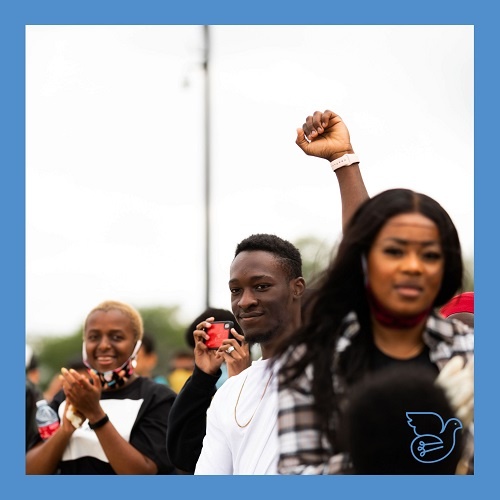Historic Racism in America – George Floyd’s Remarkable Global Justice Solidarity

In the wake of ongoing protests in the United States in demand for justice in the killing of a 46-year-old black man, George Floyd, at the hands of a white police officer, a social justice activist has insisted that the protests are legitimate. Jerry Locula highlights the historical racism and mistreatment of black people in America for the last four hundred years. It looks at how policing was associated with the transatlantic slave trade in the deep South; particularly, how white men were empowered to serve as vigilantes in responding to salves who escaped or attempted to escape. The article reveals that four centuries on, the culture has existed in law enforcement and the oppression has continued against black people; and that George Floyd’s case is the straw that broke the camel’s back. In his view, Jerry Locula maintains that the time has come for change in America, because enough is enough.
Human Rights in Afghanistan
Joe Schumacher quizzes Elizabeth Griffin of Essex University on her Amnesty International sponsored inquiry into Human Rights and the Justice system in Afghanistan. She argues for a bigger role for the UN and greater emphasis on security first.
Bujumbura (July 7-13 2003): Terror, distress and helplessness
“Today, it is exactly like in 1993. Nobody had thought of organizing relief services for survivors, casualties and the hundreds of thousands of displaced persons. Other countries have professional disaster relief services. As for us, we vegetate in daily catastrophes and such services are inexistent.
BURUNDI’S UNKNOWN HEROES
BURUNDI’S UNKNOWN HEROES Author: Susan Koscis, Search for Common Ground Originally Published at Peace and Conflict Monitor on: 03/18/2004 BURUNDI’S UNKNOWN HEROES The story of Burundi’s heroes is one of humanity against all odds. It is a story of courage in the midst of crisis, of defiance in the face of danger, of compassion […]
Freedom of Movement in Northern Uganda: Case study of Kitgum District
Key words: UNHCR, Uganda, Lords Resistance Army, humanitarian organizations, IDP camps,
A drizzly but hopeful day in Buduburum
Theresa, one of the would-be returnees to Liberia, is a middle-aged woman whose difficult life experiences show through in the lines etched on her face. She was forced to leave her country four years ago due to the ongoing violence there and has lived in exile in Ghana ever since.
Joanna Gaughan reports from Buduburum, Ghana..
Derechos y libertades: 60 Aniversario de la Declaración Universal de los Derechos Humanos
Derechos y libertades: 60 Aniversario de la Declaración Universal de los Derechos Humanos Author: Oscar Álvarez Araya Originally Published at Peace and Conflict Monitor on: 10/06/2008 Category: Comment En el Preámbulo de la Declaración se consideró que “el desconocimiento y el menosprecio de los derechos humanos ha originado actos de barbarie ultrajantes para la conciencia […]
Georgia-South Ossetia-Russia: Proposals for Immediate Steps to be taken to End Hostilities and Address Humanitarian Impacts
Kai Brand-Jacobson outines some recommendations for various actors and interest groups, including the Joint Control Commission, the EU, the US, the UN, and the Media. Rather than escalating and intensifying this conflict, these groups must realize that a peaceful resolution and a return to dialogue is in everyone’s best interest.
Bhutan, Nepal and Human Rights
The Youth Organisation of Bhutan (in exile) draws attention to the horrific forgotten plight of 135,000 refugees.
Education for water rights and environmental justice
This essay discusses an abbreviated model of education for peace and water rights.
Parts of this essay are adapted from the author’s earlier
book: The Young Ecologist Initiative: Water Manual: Lesson Plans for Building Earth Democracy (Navdanya, 2007), co-authored with Vandana Shiva and Shreya Jani.
